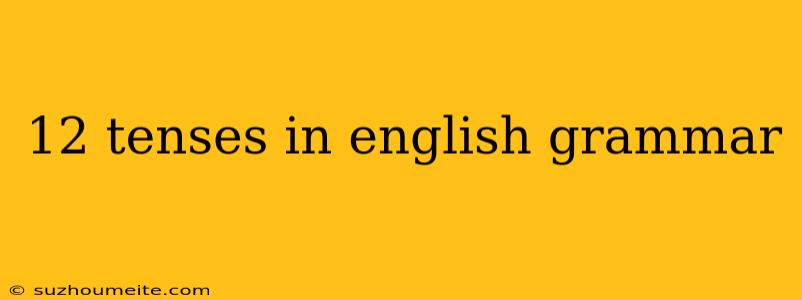12 Tenses in English Grammar
English grammar can be challenging, but understanding the 12 tenses is essential to communicate effectively. In this article, we will explore the 12 tenses in English grammar, their formations, and examples to help you master them.
1. Present Simple
The present simple tense is used to talk about habits, routines, and general truths.
- Formation: Base form of the verb (e.g., I go, you go, he/she/it goes, we go, they go)
- Example: I go to school every day.
2. Present Continuous
The present continuous tense is used to talk about actions happening at the moment of speaking.
- Formation: am/is/are + present participle (e.g., I am writing, you are writing, he/she/it is writing, we are writing, they are writing)
- Example: I am writing a letter to my friend.
3. Present Perfect
The present perfect tense is used to talk about actions that started in the past and continue up to the present moment.
- Formation: has/have + past participle (e.g., I have written, you have written, he/she/it has written, we have written, they have written)
- Example: I have written three books so far.
4. Present Perfect Continuous
The present perfect continuous tense is used to talk about actions that started in the past and continue up to the present moment, with an emphasis on the duration.
- Formation: has/have + been + present participle (e.g., I have been writing, you have been writing, he/she/it has been writing, we have been writing, they have been writing)
- Example: I have been writing articles for two years.
5. Past Simple
The past simple tense is used to talk about completed actions in the past.
- Formation: past form of the verb (e.g., I went, you went, he/she/it went, we went, they went)
- Example: I went to the party last night.
6. Past Continuous
The past continuous tense is used to talk about actions that were happening at a specific point in the past.
- Formation: was/were + present participle (e.g., I was writing, you were writing, he/she/it was writing, we were writing, they were writing)
- Example: I was writing an essay at 9 pm last night.
7. Past Perfect
The past perfect tense is used to talk about actions that happened before another action in the past.
- Formation: had + past participle (e.g., I had written, you had written, he/she/it had written, we had written, they had written)
- Example: I had written the report before the meeting.
8. Past Perfect Continuous
The past perfect continuous tense is used to talk about actions that started before another action in the past and continued up to that point.
- Formation: had + been + present participle (e.g., I had been writing, you had been writing, he/she/it had been writing, we had been writing, they had been writing)
- Example: I had been writing for three hours before I took a break.
9. Future Simple
The future simple tense is used to talk about future actions.
- Formation: will + base form of the verb (e.g., I will go, you will go, he/she/it will go, we will go, they will go)
- Example: I will finish my studies next year.
10. Future Continuous
The future continuous tense is used to talk about actions that will be happening at a specific point in the future.
- Formation: will be + present participle (e.g., I will be writing, you will be writing, he/she/it will be writing, we will be writing, they will be writing)
- Example: I will be writing my thesis next semester.
11. Future Perfect
The future perfect tense is used to talk about actions that will be completed at a specific point in the future.
- Formation: will have + past participle (e.g., I will have written, you will have written, he/she/it will have written, we will have written, they will have written)
- Example: I will have finished my studies by the time I am 25.
12. Future Perfect Continuous
The future perfect continuous tense is used to talk about actions that will start before a specific point in the future and continue up to that point.
- Formation: will have been + present participle (e.g., I will have been writing, you will have been writing, he/she/it will have been writing, we will have been writing, they will have been writing)
- Example: I will have been writing articles for five years by next June.
Master
